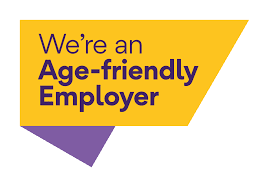Ageism in the workplace
Ageism is everywhere, yet it is the most socially “normalised” of any prejudice and is not widely countered – like racism or sexism. These attitudes lead to the marginalisation of older people within our communities. World Health Organisation.
With the pension age rising, many of us are choosing to work for longer. But the knock-on impact of this creates a challenge for companies. Most organisations today are keen to offer a career path for talent in their organisation, which in turn can lead to some tough choices.
I see this all the time in my work. So, when I was asked to chair a Winmark meeting: Developing a Strategy for Longer Working Lives, I was delighted to accept.
Setting an example: The Co-op
Our main speaker was Claire Camara, the Director of Organisational Effectiveness for Co-op. Claire initially spoke about the history of the Co-op, its culture and how the spirit and purpose set by its founders lives on. The organisation truly embeds the principles of concern for the community and inclusion across all its aspects. Claire then shared interesting facts about longer working lives:
- 50% of the population will be 50 or over by 2030
- A third of the workforce will be over 50 by 2020
- There are now 5 generations in the workplace
And, once you are over 50 you are more likely to:
- Balance work with caring for loved ones
- Develop a health condition or disability
- Be among the first to be made redundant
- Experience ageism in recruitment and hiring decisions
- Be written off for training and progression
Claire spoke to us about the advantages of focusing on age. These include being able to offer improved customer service and products, increased productivity, the plugging of skills gaps and better retention of knowledge.
It was clear that she has led initiatives that are practical, caring and smart whilst demonstrating clear financial benefits. Interestingly, the programme all stems from a spiritual foundation, from which the coop have built a support system that includes physical, intellectual and social wellbeing, as well as a focus on occupational, financial and environmental elements.
Learning and development for all
We heard about the Co-op apprenticeship scheme which recently celebrated its 1500th apprentice. There was also an inspiring story of how the Co-op created the chance for a second career for a colleague at the age of 67.
At the core of the Co-op’s success are well considered recruitment practices. It is impressive that the organisation recently retained a firm to examine every aspect of their recruitment process. It uncovered many areas for improvement that are now being actioned.
I was impressed by the leadership behaviours the Co-op has instilled. Without these, its ideals and values could not deliver the community impact that the Co-Op achieves. Claire demonstrated that with great values and by putting people at the heart of your community, you can make a difference to people’s lives. Co-op is a great example of an age-inclusive culture.
At the end of the meeting Claire invited us to consider our own ideas about age and what we can do to address the prejudice in our lives as a whole.
The implications for Russam
As a consultancy concerned with people, Russam is typically retained because we are thought to have a strong insight into the whether a person is a good fit for the role.
But this instinct can sometimes be determined by visual, cultural and situational factors and we can be biased by our personal experiences and preferences. It is therefore very important that we are a diverse team – this will go some way in improving our services.
Our consultants’ age range spans four generations and we are equally split by gender. Our people represent all social backgrounds and types and levels of education. We are currently designing an unrestricted apprenticeship programme and we are seeking to partner with people and companies that will give us an even greater diversity of thought.


Contact us
Call us on 07930 356305 or email HQ@russam.co.uk








